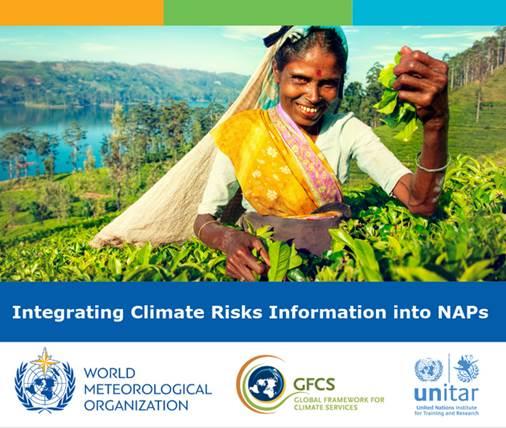
Integrating Climate Information Risk into NAPs
UN CC:Learn Partnership
IMPORTANT: Please register directly on the course website: http://unccelearn.org/
The course Integrating Climate Risk Information into NAPs shows how to strengthen National Adaptation Plans (NAPs) through appropriate climate information and coordinated policy action, enabling different types of institutions and actors to work together in a collaborative framework, drawing on the resources of the global hydro-meteorological community at large.
The course will enable you to:
- Describe the importance of climate information in adaptation planning and decision-making
- Identify technical resources for assessing climate risks
- Explore the role of National Hydro-meteorological Services in the NAP process
- Discuss how priority climate actions can be enhanced by climate scientific information
- Identify climate products and services that support NAPs
- Discuss how to promote effective partnerships between climate information producers and users
The training is modular and provides you with the liberty to choose and combine different thematic modules. There are two main themes or learning tracks available as illustrated in the figure below.
- Learning track 1: Producing climate information for NAPs
- Learning track 2: Using climate information for NAPs
Both learning tracks have in common the Intro and Wrap-up modules.
How to choose the learning track that best suits your profile and learning needs?
Once you complete the Intro module, you are recommended to undertake a test. Based on your answers to the five questions of the test you will be advised to follow either learning track 1 or 2, or both.
The course should be of particular interest to the following audiences:
- Civil servants in national ministries, provincial departments and local authorities;
- Environmental managers in private sector and civil society organizations;
- Faculty, researchers and students; and
- Interested citizens.
UN CC:Learn is a partnership of more than 30 multilateral organizations supporting countries to design and implement systematic, recurrent and results-oriented climate change learning. At the global level, the partnership supports knowledge-sharing, promotes the development of common climate change learning materials, and coordinates learning interventions through a collaboration of UN agencies and other partners. At the national level, UN CC:Learn supports countries in developing and implementing national climate change learning strategies. Through its engagement at the national and global levels, UN CC:Learn contributes to the implementation of Article 6 of the UNFCCC on training, education and public awareness-raising, and the 2012-2020 Doha Work Programme. Funding for UN CC:Learn is provided by the Swiss Government and UN partners. The Secretariat for UN CC:Learn is hosted by the UN Institute for Training and Research (UNITAR).

